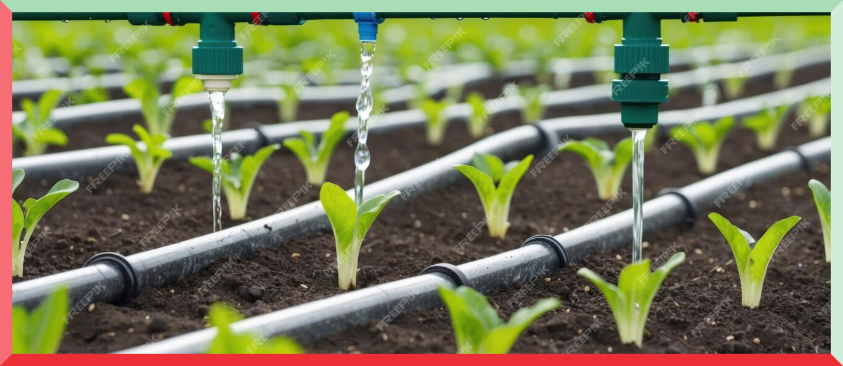
For installing any irrigation systems, pipes are crucial to supply the water.
Various pipes are available to meet different watering needs, climate conditions, and pressure requirements.
Here, I’m listing the types of pipes used in irrigation and the factors to consider when choosing the correct one.
PVC Pipes
PVC, an abbreviation for polyvinyl chloride, is commonly used in irrigation.
PVCs pipes are durable, easy to install, cost effective, and easy to cut.
They handle the pressure well, come in different thicknesses and sizes, and are very suitable for connecting underground water lines to above-ground sprinkler heads. The thicker walls give it better pressure-bearing capabilities and more durability.
One downside is that PVC is not very durable over extreme temperature changes or if exposed to sunlight for long periods.
HDPE Pipe
HDPE is a black made from high-density polyethylene, which is hard and durable.
This pipe is joined by heat fusion rather than gluing or threading, and it can be bent around corners and also handles the pressure spikes more than PVC.
By using HDPE, you don’t have to worry about corrosion, scaling, or biological growth inside the pipe. Plus, HDPE is much more resistant to the damaging impact of the sun’s UV rays.
Despite these benefits, HDPE is somewhat more expensive than PVC.
Galvanized Steel Pipes
Galvanized pipes have a zinc coating outside that resists rust.
The benefits of galvanized pipes include high pressure tolerance, durability, and fire resistance
However, Galvanized pipes are heavier than plastic pipes and require special connectors to join each section. Over time, the interior zinc lining tends to scale off, which can clog small openings like sprinkler heads.
Aluminum Pipes
Aluminum pipes have many traits of galvanized and steel pipes, which are next on the list, like being lightweight, having pressure tolerance, and being durable.
When installed properly, Aluminum Pipes are last decades and corrosion resistant than the other metal pipes, leaking less than the threaded system.
The downside of the Aluminum Pipe is that they require crimp connectors instead of less expensive threads or glue. Aluminum pipe doesn’t have as much strength and heat resistance as other materials. This can be an issue if it’s exposed to frequent high temperatures or contact with hot exhaust gasses.
Stainless Steel Pipes
Stainless Steel Pipes are the most durable and strong pipe available on the market.
Stainless steel pipe maintains all the strengths of galvanized steel, including pressure tolerance, fire resistance.
For underground applications, stainless steel pipe has excellent corrosion resistance. Moreover, for installation, stainless steel pipes are lightweight and easy to work with.
Even having all the good qualities, you don’t see the stainless steel pipes being used because it is an expensive pipe.
Copper Pipes
Copper Pipes have a long lifespan and resistance to corrosion, making them widely used in plumbing.
In irrigation, copper pipe maintains pressure very well and is free of leaks. They also do not scale internally over time like galvanized steel.
However, copper pipes are expensive and heavier and require precise soldering tools for connecting sections together.
Polybutylene Pipe
Polybutylene Pipes, well known for their long lasting durability, can last more than 20 years underground.
These pipes were made of plastic resin called polybutylene, which was seen as a futuristic material, perfect for replacing copper.
Similar to HDPE pipe, polybutylene pipe uses heat-fused fittings rather than threaded connections. Due to the heat-fused fitting, they are considered prone to leakage at the joint.
Despite this, polybutylene handles temperature fluctuations well without becoming brittle.
These are all the common types of pipes used in irrigation. To choose the suitable one for you, consider some of the factors.
Factors Determining the Correct Pipe Type
Soil Conditions
Consider the soil factors like moisture, acidic levels, potential contaminants, etc. While choosing the correct pipe.
Without corroding or degrading prematurely. HDPE and stainless steel tend to have the broadest chemical resistance.
Location
If the area where the pipe is installed has prolonged sunlight or temperature extremes, more durable or freeze-resistant materials should be selected.
HDPE or stainless steel are best suitable in these cases. PVC should be avoided above ground in freezing climates.
Water Source
Water chemistry affects the pipe requirements. Salty well water or high iron content necessitates more corrosion-resistant metals or chemically inert plastics.
Water Pressure
High water pressure needs a robust pipe made of materials less prone to bursting or leakage.
Strong metals like steel and thicker-walled PVC risers suit high-pressure irrigation.
Installation Method
Pipes like PVC are easy to cut, joint, and fit themselves.
Others, like steel or polyethylene, require professional fusion equipment and skills. Ease of repairs if the pipes fail or leak is another consideration.
Budget
Cost is always a factor to consider because inexpensive thin wall PVC and standard galvanized steel tend to be the most economical choices.
Stainless steel, thicker PVC, and flexible polyethylene come at a higher initial price but also much greater longevity.
Last Word…
Now, most irrigation systems employ readily available PVC pipes.
However, for many reasons, you should have to consider other types of pipes like various metals for durability or advanced plastics to resist chemicals, sunlight, freezing, high-pressure, etc.
An irrigation contractor can assess all the requirements and recommend the ideal pipe infrastructure.

Leave a Reply